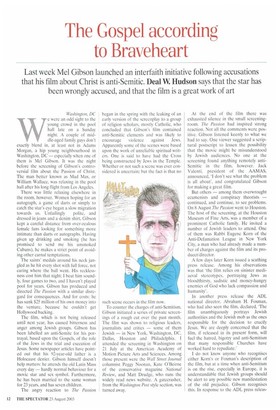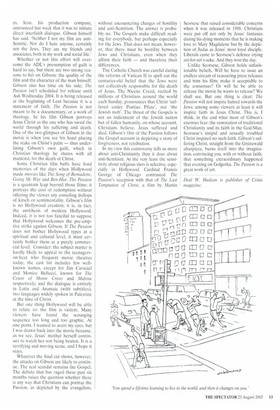The Gospel according to Bravehe art
Last week Mel Gibson launched an interfaith initiative following accusations that his film about Christ is anti-Semitic. Deal W. Hudson says that the star has been wrongly accused, and that the film is a great work of art
Washington, DC
-w e were an odd sight to the young crowd in the pool hall late on a Sunday night. A couple of middle-aged family guys don't exactly blend in, at least not in Adams Morgan, a hip young neighbourhood in Washington, DC — especially when one of them is Mel Gibson. It was the night before the screening of Gibson's controversial film about the Passion of Christ. The man better known as Mad Max, or William Wallace, was relaxing in the pool hall after his long flight from Los Angeles.
There was little relaxing elsewhere in the room, however. Women hoping for an autograph, a game of darts or simply to catch the star's eye began a slow migration towards us. Unfailingly polite, and dressed in jeans and a denim shirt, Gibson kept a careful distance from over-zealous female fans looking for something more intimate than darts or autographs. Having given up drinking and smoking (he has promised to send me his unsmoked Cubans), he makes a strict point of avoiding other carnal temptations.
The saints' medals around his neck jangled as he hit every shot with full force, not caring where the ball went. His recklessness cost him that night; I beat him soundly, four games to two. and I haven't played pool for years. Gibson has produced and directed The Passion with a similar disregard for consequences. And for costs: he has sunk $25 million of his own money into the venture, because he couldn't get Hollywood backing.
The film, which is not being released until next year, has caused bitterness and anger among Jewish groups. Gibson has been labelled an anti-Semite for his portrayal, based upon the Gospels, of the role of the Jews in the trial and execution of Jesus. Some newspaper articles have pointed out that his 92-year-old father is a Holocaust denier. Gibson himself doesn't help matters: he attends the old Latin Mass every day hardly normal behaviour for a movie star and sex symbol. Furthermore, he has been married to the same woman for 23 years, and has seven children.
The angry reaction to The Passion
began in the spring with the leaking of an early version of the screenplay to a group of religion scholars, mostly Catholic, who concluded that Gibson's film contained anti-Semitic elements and was likely to encourage violence against Jews. Apparently some of the scenes were based upon the work of unreliable spiritual writers. One is said to have had the Cross being constructed by Jews in the Temple. Whether or not such a scene was ever considered is uncertain; but the fact is that no
such scene occurs in the film now.
To counter the charges of anti-Semitism, Gibson initiated a series of private screenings of a rough cut over the past month. The film was shown to religious leaders, journalists and critics — some of them Jewish — in New York, Washington, DC, Dallas, Houston and Philadelphia. I attended the screening in Washington on 21 July at the American Academy of Motion Picture Arts and Sciences. Among those present were the Wall Street Journal columnist Peggy Noonan, Kate O'Beirne of the conservative magazine National Review, and Matt Drudge, who runs the widely read news website. A gatecrasher, from the Washington Post style section, was turned away. At the end of the film there was exhausted silence in the small screeningroom. The Passion had inspired strong reaction. Not all the comments were positive. Gibson listened keenly to what we had to say. One viewer suggested a scriptural postscript to lessen the possibility that the movie might be misunderstood by Jewish audiences. No one at the screening found anything remotely antiSemitic in the film, however. Jack Valenti, president of the AAMAS, announced, don't see what the problem is all about', and congratulated Gibson for making a great film.
But others — among them overwrought ecumenists and conspiracy theorists — continued, and continue, to see problems. On 8 August The Passion went to Houston. The host of the screening, at the Houston Museum of Fine Arts, was a member of a prominent Catholic family. He invited a number of Jewish leaders to attend. One of them was Rabbi Eugene Korn of the Anti-Defamation League in New York City, a man who had already made a number of charges against the film and its producer/director.
A few days later Korn issued a scathing press release. Among his observations was that 'the film relies on sinister mediaeval stereotypes, portraying Jews as bloodthirsty, sadistic and money-hungry enemies of God who lack compassion and humanity'.
In another press release the ADL national director, Abraham H. Foxman, who had also seen the film. declared, 'The film unambiguously portrays Jewish authorities and the Jewish mob as the ones responsible for the decision to crucify Jesus. We are deeply concerned that the film, if released in its present form, will fuel the hatred, bigotry and anti-Semitism that many responsible Churches have worked hard to repudiate.'
do not know anyone who recognises either Korn's or Foxman's description of the film, but at a time when anti-Semitism is on the rise, especially in Europe, it is understandable that Jewish groups should be alert to any possible new manifestation of the old prejudice. Gibson recognises this. In response to the ADL press releas
es, Icon, his production company, announced last week that it was to initiate direct interfaith dialogue. Gibson himself has said, 'Neither I nor my film are antiSemitic. Nor do I hate anyone, certainly not the Jews. They are my friends and associates, both in my work and social life.'
Whether or not this effort will overcome the ADL's presumption of guilt is hard to say, but there are two strong reasons to bet on Gibson: the quality of the film and the character of the man himself. Gibson also has time on his side; The Passion isn't scheduled for release until Ash Wednesday 2004. It is being released at the beginning of Lent because it is a statement of faith. The Passion is not meant to be a documentary, or a work of theology. In his film Gibson portrays Jesus Christ as the one who has saved the world through his suffering and death. One of the two glimpses of Gibson in the movie is when you see his hand placing the stake on Christ's palm — thus underlining Gibson's own guilt, which in Christian theology he shares with all mankind, for the death of Christ.
Some Christian film buffs have fond memories of the days when Hollywood made movies like The Song of Bernadette, Going My Way and Ben-Hur. The Passion is a quantum leap beyond those films: it portrays the cost of redemption without offering the viewer any consoling dollops of kitsch or sentimentality. Gibson's film is no Hollywood creation; it is, in fact, the antithesis of modern Hollywood. Indeed, it is not too fanciful to suppose that Hollywood welcomes the pre-emptive strike against Gibson. If The Passion does not bother Hollywood types at a spiritual and cultural level, it must certainly bother them at a purely commercial level. Consider: the subject matter is hardly likely to appeal to the teenagerson-heat who frequent movie theatres today; the cast list includes few wellknown names, except for Jim Caviezel and Monica Bellucci, known for The Count of Monte Cristo and Malena respectively; and the dialogue is entirely in Latin and Aramaic (with subtitles), two languages widely spoken in Palestine at the time of Christ.
But one thing Hollywood will be able to relate to: the film is violent. Many viewers have found the scourging sequence too long and too graphic. At one point, I wanted to avert my eyes, but I was drawn back into the movie because, as we see, Jesus' mother herself continues to watch her son being beaten. It is a terrifying and moving scene, and I hope it stays.
Whatever the final cut shows, however, the attacks on Gibson are likely to continue. The real scandal remains the Gospel. The debate that has raged these past six months raises the question whether there is any way that Christians can portray the Passion, as depicted by the evangelists, without encountering charges of hostility and anti-Semitism. The answer is probably no. The Gospels make difficult reading for everybody, but perhaps especially for the Jews. That does not mean, however, that there must be hostility between Jews and Christians, even when they affirm their faith — and therefore their differences.
The Catholic Church was careful during the reforms of Vatican II to spell out the centuries-old belief that the Jews were not collectively responsible for the death of Jesus. The Nicene Creed, recited by millions of Christians around the world each Sunday, pronounces that Christ 'suffered under Pontius Pilate', not 'the Jewish mob'. The thrust of the Gospels is not an indictment of the Jewish nation but of fallen humanity, on whose account. Christians believe, Jesus suffered and died. Gibson's film of the Passion follows the Gospel account in depicting a story of forgiveness, not retribution.
In my view this controversy tells us more about anti-Christianity than it does about anti-Semitism. At the very least the sensitivity about religious slurs is selective, especially in Hollywood. Cardinal Francis George of Chicago contrasted The Passion's reception with that of The Last Temptation of Christ, a film by Martin
Scorsese that raised considerable concerns when it was released in 1988. Christians were put off not only by Jesus' fantasies during his dying moments that he is making love to Mary Magdalene but by the depiction of Judas as Jesus' most loyal disciple. Liberals came to Scorsese's defence crying art-for-art's-sake. And they won the day.
Unlike Scorsese, Gibson holds unfashionable beliefs. Will he have to issue an endless stream of reassuring press releases and trim his film; make it acceptable to the consensus? Or will he be able to release the movie he wants to release? We shall see. But one thing is clear: The Passion will not inspire hatred towards the Jews: among some viewers at least it will inspire faith in Jesus Christ. This is, I think, in the end what most of Gibson's enemies fear: the restoration of traditional Christianity and its faith in the God/Man. Scorsese's insipid and sexually troubled Christ inspired no such faith. Gibson's suffering Christ, straight from the Griinewald altarpiece, burns itself into the imagination, convincing you, with or without faith, that something extraordinary happened that evening on Golgotha. The Passion is a great work of art.
Deal W. Hudson is publisher of Crisis magazine.



























































 Previous page
Previous page